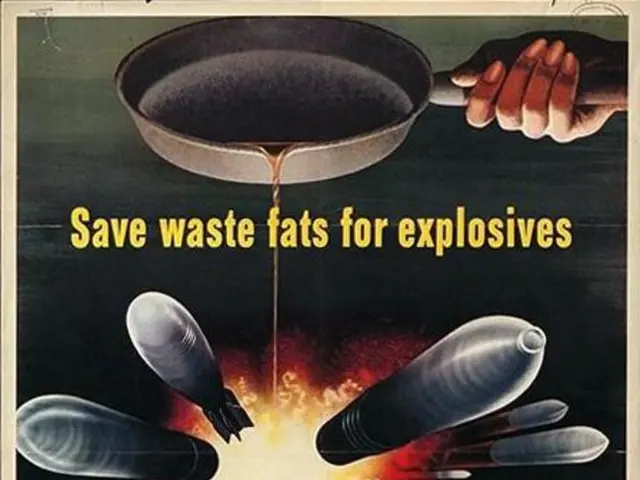Escalating Malnutrition Alarm among Children in Gaza: United Nations Agencies Issue Grave Warnings
Chaos and Starvation in Gaza: The Uneasy Stalemate
Two months into Israel's blockade of Gaza, humanitarian aid organizations are out of food supplies to distribute, and some medicines are running out. The situation in Gaza is beginning to resemble an apocalyptic wasteland, according to the United Nations (UN) and aid organizations.
The International Court of Justice is holding a week of hearings on Israel's obligation to "ensure and facilitate" humanitarian assistance to Palestinian civilians in Gaza. This comes as Israel enforces a total blockade on humanitarian aid, cutting off all aid entry on March 2nd and renewing its military campaign on March 18th in an attempt to force Hamas to release remaining hostages.
Israel has also banned cooperation with UNRWA's activities in Gaza and the occupied West Bank, claiming that the UN agency has been infiltrated by Hamas, a charge the UN agency vehemently denies.
Acute malnutrition among children in Gaza is surging. UNICEF's Middle East and North Africa Communications Manager, Tess Ingram, told our website that over 10,000 cases of acute malnutrition have been identified this year, with 1,600 of those cases severe. The data refers to children aged between six months and five years old.
The number of children in Gaza treated for acute malnutrition almost doubled over the course of a month, figures provided by UNICEF show, with 2,027 children admitted for treatment in February and 3,696 children in March. Before the conflict, acute malnutrition was almost nonexistent in Gaza, UN officials have stated.
Children under five are the most vulnerable to malnutrition, Ingram noted, due to specific nutrition needs. "Without adequate food supplies, we will see the numbers of malnourished children rise - and without treatment, severely malnourished children will get sicker and it will become life-threatening," Ingram said.
UNICEF's malnutrition prevention food stocks (such as supplies of multiple micronutrients) are "fully depleted," according to Ingram, while malnutrition treatment food stocks "have been depleted to very limited levels."
Severe acute malnutrition requires specific treatment, Ingram emphasized, with long-term risks including lifelong impacts on children's brain development.
In a recent survey, 90% of children under two were found to be eating only two or fewer food groups, adding that these were breastmilk and grains. "It's clearly not enough for a child's growth or development, and it's been sustained for many months," Ingram said.
Desperate families are scraping by as food supplies dwindle. Some try to afford "whatever little they can at markets," but prices have risen astronomically.
Around a third of medicines are already out of stock, including those for diabetes, antimicrobial medicines, and topical medicines, while another third is expected to run out within weeks. The mental health of children, as well as their caregivers, is at a breaking point, Ingram said. "I know of one 5-year-old girl who was orphaned and then was separated for a period from her grandmother, who had become her primary caregiver. She stopped speaking for months."
The NGO Mercy Corps also reported dire conditions on the ground. "The situation is extremely miserable and deteriorating rapidly, life is getting worse in every way," said one of their team members in Gaza. "Food is largely unavailable; only some canned goods, legumes, and overpriced local vegetables remain."
"People are surviving on whatever canned food or pasta they had stored, or paying unbearable prices for the little that's left. The collapse of food systems has left many families without even a single daily meal."
Jonathan Fowler, senior communications manager at UNRWA, described the situation in Gaza as "dystopian and apocalyptic." "With every hour that goes by (under the blockade), more people fall into a higher risk category of malnutrition," he said. "The forecast is of widespread severe acute malnutrition. And we don't have means to rein it in, because medicalized food is also not coming in at all."
UNRWA has run out of flour to supply kitchens, and it distributed its remaining 250 emergency food parcels (containing dried and canned food for two weeks) last week. The World Food Programme (WFP) also ran out of food stocks this week.
"We're moving in the direction of famine ... We're staring that risk in the face," said Fowler.
Sources:
[1] "As Malnutrition Soars, Aid Agencies Warn of Famine in Gaza" by Al-Jazeera English, April 28, 2023.[2] "Children's Futures in Peril as Effects of Gaza Blockade Deepen: Save the Children" by Save the Children, April 27, 2023.[3] "Israel's Gaza blockade is turning into a humanitarian catastrophe" by Human Rights Watch, April 26, 2023.[4] "UNICEF Sounds Alarm on Humanitarian Crisis in Gaza" by UNICEF, April 25, 2023.
- Prevention of severe acute malnutrition requires specific therapies and treatments.
- UNICEF's malnutrition treatment food stocks are severely depleted.
- The number of children in Gaza treated for acute malnutrition has almost doubled over a month.
- In Gaza, children are eating only two or fewer food groups.
- Children under five are the most vulnerable to malnutrition in Gaza.
- Without treatment, severely malnourished children will get sicker and it could become life-threatening.
- Israel enforces a total blockade on humanitarian aid to Gaza.
- The mental health of children and their caregivers in Gaza is at a breaking point.
- Food supplies in Gaza are dwindling, leaving families to scrape by at markets where prices have risen astronomically.
- Around a third of medicines are already out of stock in Gaza.
- The World Food Programme (WFP) has run out of food stocks in Gaza.
- UNRWA has run out of flour and distributed its remaining emergency food parcels last week.
- The industry of workplace-wellness should prioritize the prevention and management of chronic diseases like malnutrition.
- Science has shown that micronutrients play a crucial role in preventing malnutrition.
- A proper diet high in micronutrients is essential for digestive health and eye health.
- Health and wellness professionals should educate the public on the importance of micronutrients for overall health.
- In the face of climate change, it's crucial to prioritize environmental-science and its impact on food production and distribution.
- Mental-health conditions often go hand in hand with chronic diseases, making holistic care essential.
- Men's health also includes addressing cardiovascular-health and prostate-related concerns.
- Women's health encompasses reproductive health, mental health, and menopause management.
- Parenting requires a holistic approach that nurtures both the physical and emotional wellbeing of children.
- Good nutrition is vital for the development and growth of children.
- Overpriced food is an obstacle to achieving proper nutrition.
- CBD may help manage chronic conditions like chronic pain and anxiety.
- Neurological-disorders like Alzheimer's and Parkinson's require ongoing medical-conditions management.
- Hearing loss can be a result of poor nutrition and chronic diseases.
- Fitness and exercise are essential for maintaining cardiovascular-health and managing chronic diseases.
- Autoimmune-disorders like lupus and rheumatoid arthritis require careful management and therapies.
- Respiratory-conditions like asthma and COPD require proper management to prevent exacerbations.
- Skin-care and skin-conditions treatments are crucial for maintaining eye-health and overall appearance.










